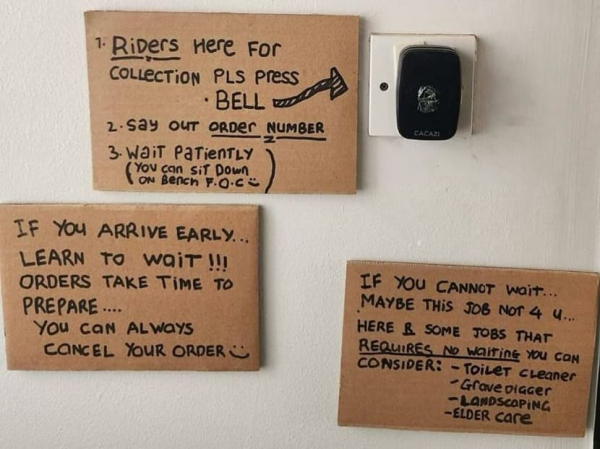#trending: Home-based business slammed for ‘rude’ signs targeting delivery riders

In Singapore, a home-based business is facing backlash for displaying signs targeting food delivery riders, which have been criticized for their rudeness and lack of respect. Shared on Instagram by Wake Up, Singapore and SG Riders, a group advocating for delivery riders, the signs outline specific instructions for riders, including ringing the bell, stating their order number, and waiting patiently. However, it's the tone of the messages that has sparked outrage. One sign suggests that if riders cannot wait, they should reconsider their job, listing alternatives like toilet cleaning and grave digging. SG Riders expressed disapproval, emphasizing the financial pressures that prompt riders to seek efficient deliveries. Social media responses echoed this sentiment, condemning the condescending tone and pledging to boycott the business, identified by some as Bincho Brews. With thousands of likes and comments, the post underscores the need for businesses to show empathy and understanding towards delivery workers. As discussions escalate, the business in question is yet to respond to the criticism.
The post garnered almost 1,000 likes, but many commenters shifted the focus to the essential role food delivery riders play in daily life. One user emphasized their humanity, stating, “You can't just bully riders. Without them, I don't think I can survive.” This incident, they argued, exposes a deeper societal issue of disrespect towards essential workers. Another user criticized the notion that luxuries and conveniences can exist without service workers, calling attention to the disconnect between perception and reality. The use of "FOC" ("free of charge") to describe sitting on the bench sparked further criticism. Commenters questioned the business owners' lack of empathy, especially when suggesting alternative jobs that require patience and hard work. They wondered aloud if any guilt accompanied the writing of such messages.
In conclusion, the controversy surrounding the home-based business and its treatment of food delivery riders underscores broader issues of respect and appreciation for essential workers in society. While the post received significant attention on social media, with nearly 1,000 likes, it also sparked a crucial conversation about the importance of empathy and understanding towards those who provide essential services. The comments from online users highlighted the indispensable role that delivery riders play in daily life and criticized the lack of empathy displayed by the business owners. Ultimately, this incident serves as a reminder of the vital contributions of essential workers and the need for greater recognition and respect for their efforts.


